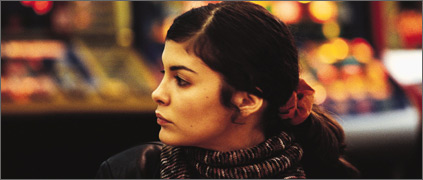
|
Dirty Pretty ThingsBy David MumpowerMay 26, 2003
Beneath the superficial pretenses of society, there lurks a seamy underbelly. Dirty Pretty Things intricately exploits this murkier realm below the surface as it shows us a world comprised of outcasts from other places who have fled their previous lives. With all of their bridges burned, they are forced to reside in the sleazier side of London while working for an upper class hotel whose clientele treats them as something less than human, the seen but never noticed subservient working class that was also recently explored in Gosford Park. The central draw of Dirty Pretty Things will obviously be its female lead, Audrey Tautou. The beguiling French actress will probably spend the next five years trying to differentiate her other characters from the type-cast of Amélie of Montmartre. She begins her move away from that star-making performance by taking on the role of Senay, a Turkish chambermaid with a new roommate. The problem Senay faces is that according to the terms of her residence in England, she is not to earn any form of ancillary income, so both the job and the rent money she is receiving would cause her to be expelled from England if immigration were to discover them. Their occasional appearances at her apartment disrupt the convenience of her new existence, but are much more damaging to new roomie Okwe, who is actually the main character in the movie despite what the marketing might lead you to believe. Played by Chiwetel Ejiofor, an unknown in North America, Okwe is the emotional center of Dirty Pretty Things; ergo, your enjoyment of the movie will be largely based on how much you are drawn to this performance no matter what your predisposition toward Tautou may be. Okwe is running from demons that are only fully explained toward the end of the film so for most of it, he is enigmatic. It’s a remarkable acting accomplishment of withdrawn, carefully measured restraint. Ejiofor keeps the audience guessing about what is going on behind his brooding eyes as we see the sinister events of the hotel unfold before him. As to these events, they are keyed upon Okwe’s new job as the desk clerk and concierge at the hotel. As a recent hire, he doesn’t want to stir the pot, but he is curious why the room service light seems to go off at the strangest hours of the evening. Even odder is how the doorman and the manager’s behavior changes dramatically once that light comes on. And exactly what is it that Okwe has just found in the toilet that is stopping up the plumbing? There are only four other characters in this sleek cast. Zlatko Buric portrays Ivan, the criminally underwritten doorman. His part is the least noteworthy and most quickly forgotten of the group. Sneaky, the manager of the hotel, is inscrutable at first but as events proceed, he becomes one of the most loathsome people this side of the Stygian Abyss. This powerful acting job by Sergi López makes the plight of Okwe and Senay seem that much more desperate. Also noteworthy is the performance of Benedict Wong as Guo Yi, a man Okwe believes to be his friend though there is evidence to suggest otherwise as their chess games offer the hint of a more contentious aspect to their relationship. Finally, Sophie Okonedo plays a mystery woman who keeps showing up right around the time Okwe notices the blinking light for room service. Out of all the roles in the film, hers offers the strangest duality as even the lesser beings look down on her, despite the fact that the hotel industry is well known for its meretricious nature. They might have to serve whores but they don’t have to pretend to like it, so Sophie’s Juliette is shunned by even the lowest people of London society. The most surprising aspect of Dirty Pretty Things is how dark the topics are. After seeing Tautou in Amélie, you might be expecting an Audrey Hepburn-esque run of romantic comedies from her. Drop those expectations right now, as this flick is one of the most sordid and confounding plots in recent cinema. For those of you willing to move past your expectations of a light-hearted follow-up to Amélie, Dirty Pretty Things might pleasantly surprise you. It is deliberately paced to the point of being lethargic and several of the scenes are best described as laconic. The minimalist approach to creating a late night environment of boredom following by periods of kinetic surprise will prove divisive to audiences. I must admit that there were times I wished more were happening despite the spectacular performances. Great thespians aside, the combination of the dark subject matter and snail’s pacing of the key scenes left me checking my watch a lot more often than I should for a film. I think it deserves a viewing, but it’s certainly not for everyone and it frankly wasn’t really for me. As a final note for those of you interested in seeing Dirty Pretty Things, we have made an intentional decision to not spoil the surprise of what is going on at the hotel. If you want to remain in the dark about this, you probably don’t want to read a lot of reviews of the film until after you’ve watched it. Otherwise, your enjoyment will be reduced by the lack of surprise. |
Wednesday, January 07, 2026
© 2006 Box Office Prophets, a division of One Of Us, Inc.